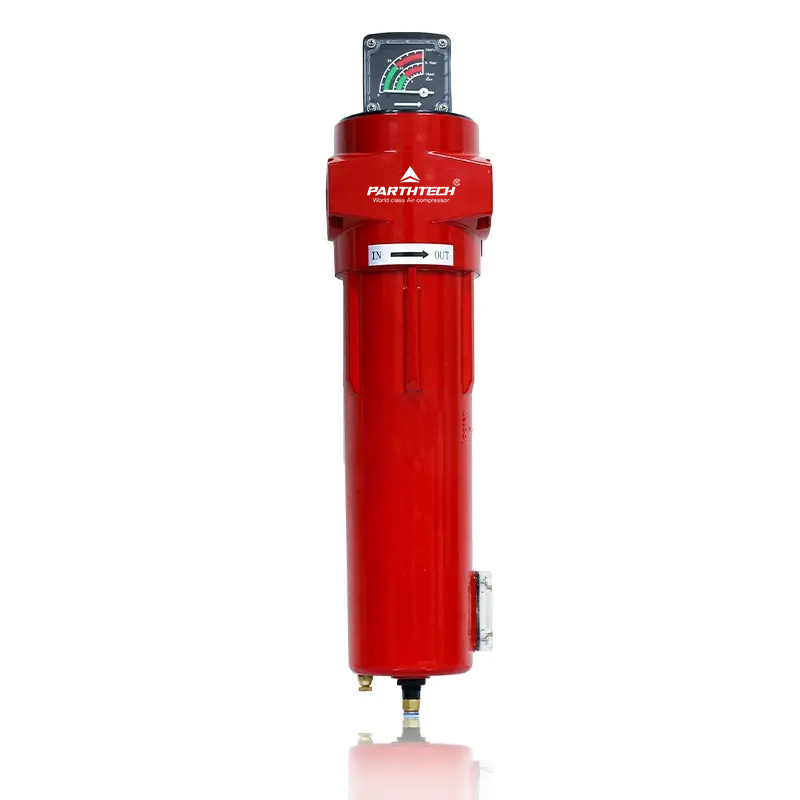-
Call
-
Whatsapp
9825014048
-
Location


Micro Filter
Micro Filter
Among various industrial and commercial applications, compressed air quality is the most important. Water, oil, and particulate matter contaminants can damage equipment, product quality, and the environment. This is where microfilters come into play. In this article, we explore the world of micro filters, their functions, characteristics, applications and critical roles in ensuring compressed air is clean and healthy.
Microfilters, commonly referred to as air filters or particulate filters, are essential components of compressed air systems. Their main function is to remove dust, dirt, and other solid particles from the compressed air. These particles can be caused by environmental factors or by components of the compressor system itself.
How Micro Filters Work
- Mechanical filters: This allows gases, such as shredded paper or materials, to pass through the filters, which trap particles as they pass through the air
- Centrifugal separation: Some microfilters use centrifugal force to separate large particles from the gas, directing the gas in a spiral path, causing the particles to migrate to the outer wall and fall into a collection chamber in the mouth
- Fusion Filtration: Fusion filters are designed with special filtration media to capture excellent particles, as well as oil aerosol, allowing these particles to be combined into smaller droplets that can be easily removed
Types of micropores
- Particle filtering: This machine focuses on removing small solid particles, making it suitable for all industrial applications.
- Oil Removal Filters: In areas where oil contamination is a concern, these filters target oil and aerosol droplets, ensuring that the air is free of oil
- High-efficiency filters: This unit is designed for critical applications where the highest air quality standards must be met, such as in the pharmaceutical or food processing industries Use of microfilters
- Construction: Microfilters protect delicate devices such as air conditioners and appliances from particulate contaminants.
- Food and Beverage: Maintaining ventilation during food production is essential to maintain hygiene standards and prevent raw material contamination.
- Pharmaceuticals: Microfilters are used in the pharmaceutical industry to ensure the purity of drugs and pharmaceutical products.
- Electronics: Clean air is essential to prevent damage or malfunction of delicate electronics.
- Automotive: In automotive painting, microfilters ensure a high-quality finish by removing tiny particles that can damage the paint.
- Environmental Control: Microfilters help maintain environmental conditions in clean rooms and laboratories.
Advantages of using Micro Filters
- Equipment Protection: Micro-filters protect equipment and downstream processes by preventing wear and tear related to particulate matter.
- Process Quality: In industries such as food processing and pharmaceuticals, micro-filters improve the purity and uniformity of the final product.
- Energy efficiency: By removing impurities, microfilters improve equipment efficiency and reduce energy consumption.
- Environmental compliance: Micro-filters help businesses meet ecological standards by removing particulate emissions.
- Health and Safety: Clean air free of particulate matter is essential to maintaining a safe and healthy working environment.


FAQ

Frequently Ask Questions
The frequency of replacement or service depends on factors such as air quality requirements and operating conditions. It is generally recommended to follow the manufacturer’s instructions.
Some microfilters, especially oil filters, can effectively remove oil and aerosol precipitates from compressed air.
Microfilters focus primarily on solids removal, but additive filters can help remove condensation by trapping small droplets.
High efficiency filters are generally required in areas where the highest air quality standards must be met, such as in pharmaceuticals or semiconductor manufacturing.
Yes, by removing impurities, micro-filters can improve device performance, reduce energy consumption and lower operating costs.

